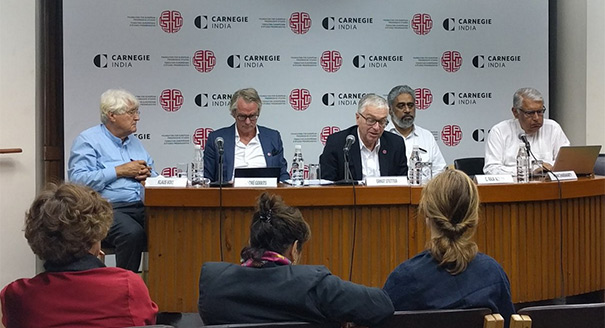{
"authors": [
"C. Raja Mohan",
"Klaus Voll",
"André Gerrits",
"Ernst Stetter",
"Pinak Ranjan Chakravarty"
],
"type": "event",
"centerAffiliationAll": "",
"centers": [
"Carnegie Endowment for International Peace",
"Carnegie India"
],
"collections": [],
"englishNewsletterAll": "",
"nonEnglishNewsletterAll": "",
"primaryCenter": "Carnegie India",
"programAffiliation": "",
"programs": [],
"projects": [],
"regions": [
"India",
"Middle East",
"Europe",
"Indo-Pacific"
],
"topics": [
"Foreign Policy"
]
}
Aligning Regional Interests
Fri, September 30th, 2016
New Delhi
As the U.S. commitment to NATO comes under question and countries grapple with Chinese and Russian assertiveness, there is a heavier burden on regional powers to take on more responsibility in the Middle East and in the Indian Ocean. The European Union and India must forge new connections that will provide solutions to the challenges faced in these regions.
Carnegie India and the Foundation for European Progressive Studies organized a conference on EU-India cooperation in the Indian Ocean and the Middle East. The primary objective of this conference was to enable an exchange of ideas between leading experts from Europe and India and to initiate a dialogue on the strategic partnership that would result in specific policy recommendations.
Discussion Highlights
- India and the Middle East: Participants explained New Delhi’s position on some of the key issues in the Middle East. For example, they said that India opposes regime change through foreign intervention, refuses to take sides between Saudi Arabia and Iran, and supports efforts by the UN to find a peaceful and negotiated end to regional wars. In this context, they said, Prime Minister Modi has continued to forge strong economic ties with countries in the Middle East, while avoiding any adverse fallout from the instability in the region. They added that India’s productive relationships with Saudi Arabia, Iran, and Israel put New Delhi in the position to be instrumental to EU efforts to stabilize the region.
- The EU and the Middle East: Participants said that the EU’s key strategic interests in the region include trade and maintaining security to avoid a spillover of unrest into Europe. In accordance with its identity as a key geopolitical power, they said, the EU seeks to assert its presence as a counterweight to the United States, Russia, and China. However, participants acknowledged that, despite their crucial strategic interests, the EU is hamstrung by the lack of a unified foreign and security policy.
- Growing Tensions in the Indian Ocean: Participants expressed concern that, as American maritime dominance declines and as numerous countries of the Asia-Pacific are engaged in a period of rapid arms buildup, the Indian Ocean Region (IOR) is increasingly in danger of becoming a zone of tension. This is underscored by the fact that the IOR envelops a deeply fragmented political space susceptible to manipulation by external forces.
- Potential Fora for Dialogue: The Indian Ocean Naval Symposium (IONS) includes both France and the United Kingdom as full members, and Indian Ocean Rim Association (IORA) includes France, the United Kingdom, and Germany as dialogue partners. While these fora facilitate important conversations, participants also discussed the possibility of developing IONS into an Indian Ocean form of the ASEAN Defense Ministers’ Meeting, given the presence of European territories in the IOR such as the overseas French departments of Réunion, Mayotte, and Scattered Islands.
- Closer Cooperation: Europe’s security interests in the Indian Ocean offer significant opportunities for closer cooperation, participants said. They suggested that one such opportunity would be to expand joint naval exercises, such as the French-Indian Varuna, to include more nations. Participants emphasized bolstering existing mechanisms over developing new ones.
- Prospects for Regional Cooperation: There is a lack of mutual understanding between India and the EU, participants said. They said that India prefers to deal with members bilaterally and mistakes European standards as measures of protectionism. Furthermore, India is increasingly focused on working with the United States as a security partner in Asia. However, participants asserted, there are obvious converging interests, like economic relations and a stable Afghanistan. They argued that there is especially room for both sides to work together in Afghanistan, from sustaining the current order through political consultation, to eventually working together strategically with expanded military intelligence exchanges to deal with radicalization in the region.
- Changing Perspectives: Indians in general are not aware of the internal workings of the EU and its role as an external actor, especially as a security provider, participants said. Conversely, the EU still views India as a prospective power. That is changing, however, they said. The EU paid attention to Indian Foreign Secretary Dr. S. Jaishankar’s speech emphasizing New Delhi’s intention to be a ‘leading’ instead of a ‘balancing’ power, and increasingly perceives India to be a strategic partner.
- Shared Values: India and the European Union are natural partners, participants said. They share common interests and foster the same liberal values of democracy, human rights, respect for the environment and a promotion of rule based solutions in accordance with the international legal order. The way forward for the India-EU relationship depends on the identification of joint interests, on political will, and effective people-to-people dialogue. Think-tanks, in this respect, can be instrumental in overcoming knowledge gaps and can nurture new ideas that offer concrete solutions to policymakers, participants concluded.
This event summary was prepared by Arushi Kumar, a research assistant at Carnegie India, with additional inputs from Sharanya Rajiv and Sulakshan Sampath, interns at Carnegie India.
Carnegie does not take institutional positions on public policy issues; the views represented herein are those of the author(s) and do not necessarily reflect the views of Carnegie, its staff, or its trustees.
Event Speakers
C. Raja Mohan
Former Nonresident Senior Fellow, Carnegie India
A leading analyst of India’s foreign policy, Mohan is also an expert on South Asian security, great-power relations in Asia, and arms control.
Klaus Voll
André Gerrits
Ernst Stetter
Pinak Ranjan Chakravarty